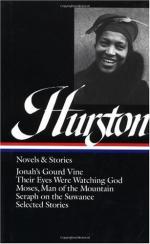|
This section contains 5,036 words (approx. 17 pages at 300 words per page) |

|
SOURCE: Seidel, Kathryn Lee. “The Artist in the Kitchen: The Economics of Creativity in Hurston's ‘Sweat’.” In Zora in Florida, edited by Steve Glassman and Kathryn Lee Seidel, pp. 110-20. Orlando: University of Central Florida Press, 1991.
In the following essay, Seidel asserts that “Sweat” is valuable for its depiction of the economic situation in Eatonville, Florida, in the early decades of the twentieth century as well as its “harsh, unrelenting indictment of the economic and personal degradation of marriage in a racist and sexist society.”
Zora Neal Hurston's short story “Sweat” (1926) presents a radical transformation of an oppressed black domestic worker who attempts to envision her work as a work of art. The story is remarkable in Hurston's body of work for its harsh, unrelenting indictment of the economic and personal degradation of marriage in a racist and sexist society.
To accomplish this, “Sweat” functions at one level...
|
This section contains 5,036 words (approx. 17 pages at 300 words per page) |

|


